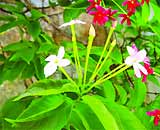People in the South of Vietnam often use the seeds of the Trâm Bầu plant to expel various types of worms. This herbal remedy has also been formulated into pills by scientists. In the North, locals typically use the seeds of the Sử Quân plant (Quisqualis indica) for this purpose.
The Trâm Bầu, also known as Trưng Bầu, Tim Bầu, or Song Re, is a small shrub with pale yellow flowers and thin, four-winged fruits. This plant grows wild mainly in the Mekong Delta provinces.
The Trâm Bầu fruits are harvested in the fall and winter, where the seeds are extracted and dried in the sun or by other means. The decoction of Trâm Bầu seeds and the extraction of components like tannins, flavonoids, and fats create a more potent effect when combined than when extracted separately.
For consumption, the Trâm Bầu seeds are roasted, crushed, and mixed with ripe bananas to swallow, as the seeds have a very bitter, astringent taste and a pungent smell. Adults typically consume 10-15 seeds daily, while children use 5-10 seeds depending on their age. Alternatively, crushed Trâm Bầu seeds can be mixed with equal amounts of Tam The leaves (Piper lolot), then blended with flour to make steamed cakes eaten in the morning on an empty stomach.
Based on this experience, the Institute of Ethnic Medicine in Ho Chi Minh City has developed “Trâm Bầu pills” containing extracts of these seeds combined with Cassia obtusifolia powder, each pill weighing 0.25 grams. The Trâm Bầu pills have been administered to 450 patients infected with roundworms (with stool tests conducted before and after treatment). Each day, adults take 10 pills; children aged 6-14 take 5 pills, and children aged 1-5 take 1 pill (taken on an empty stomach for three consecutive days).
Results showed that the roundworm expulsion rate from Trâm Bầu pills was 70%, compared to 90% for the commonly used Piperazine; the remaining egg rate in stools was 57% (while Piperazine was 20%).
Some people have even consumed the mucilage from the inner bark of the Trâm Bầu tree and reported similar results. In Cambodia and Thailand, Trâm Bầu seeds are also used as a deworming medication.
Sử Quân Plant
 |
|
Sử Quân Plant. |
The Sử Quân plant, also known as the Wormfruit plant, has the scientific name Quisqualis indica L. This is a climbing plant with white flowers that later turn pink or red. The dry fruit has five longitudinal ridges. The plant grows wild and is also cultivated for ornamental purposes in many areas.
The part of the Sử Quân plant primarily used for medicinal purposes is its fruit, which is harvested from September to November when the skin turns brownish-red, hard, and glossy. The fruits are taken, shelled, and dried. For use, the outer shell is cracked open to extract the seed, both ends are cut off, and the surrounding silk membrane is removed (as it is believed these parts cause discomfort), followed by pan-frying.
The active components with deworming effects in Sử Quân include quisqualic acid, L-proline, L-asparagine, organic acids, and fats. It has long been recognized as a deworming agent in many Asian countries. Modern medicine also confirms that Sử Quân can kill earthworms and roundworms. Children in mountainous regions often pick fresh fruits and eat the seeds raw, observing expulsion of worms.
The powdered form of Sử Quân is used at a dosage of 5-10 grams for children, depending on age, and 10-20 grams for adults, taken for three consecutive mornings. It can be combined with tamarind seed powder in equal amounts, without the need for additional laxatives. It is often used in conjunction with other medicinal herbs to enhance nutritional properties, counteract pallor, emaciation, and improve digestion according to the following formulas:
– Sử Quân seeds 10 g, lotus seeds 20 g, sprouted rice 30 g. All ingredients are dried, finely powdered, and divided into 2-3 doses throughout the day.
– Sử Quân powder 5 g, Dang Shen 10 g, Bai Zhu 10 g, fried licorice 5 g. Decoct with 200 ml of water until it reduces to 50 ml, taken once a day.
– Sử Quân seeds, nutmeg, and malt each 150 g, Shen Qu (digestive herb) and Huang Lian (Coptis chinensis) each 300 g, 20 betel nuts, 60 g of Muc Huong (alpinia). All are ground into powder, mixed with pig bile to form pills the size of corn kernels. Take 30 pills with warm water daily.
Some have used Sử Quân roots instead of the seeds and found they still expelled worms without causing hiccups. The preparation is as follows: Harvest the roots year-round, wash them clean, chop into small pieces, and dry. For use, take 20 g of Sử Quân roots and 30 g of Job’s tears, decoct with water or grind to a fine powder, consumed throughout the day.


















































